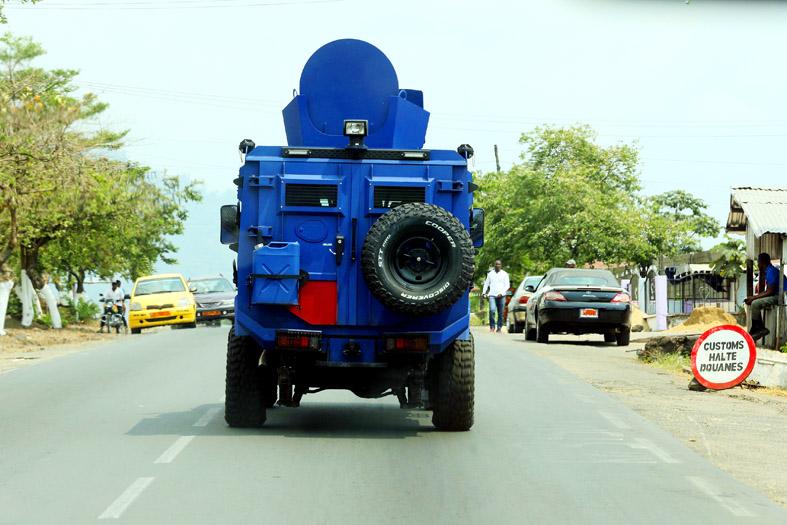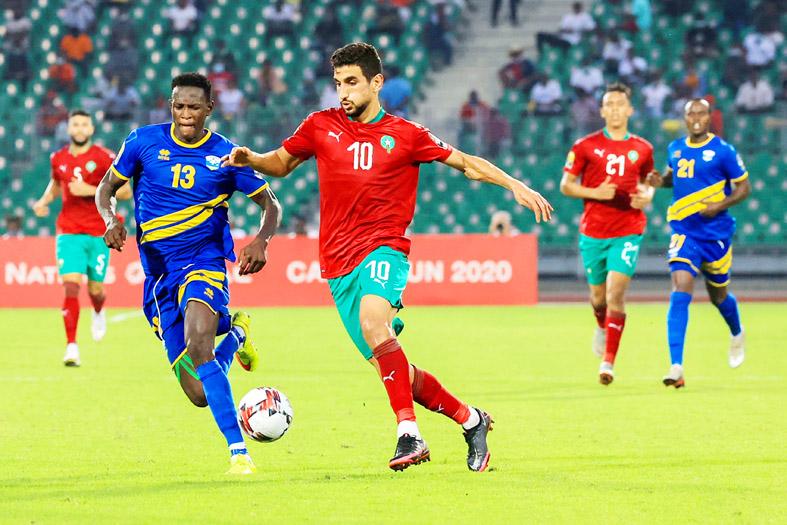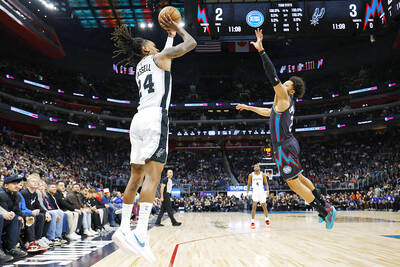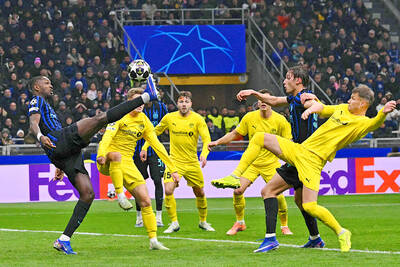A stone’s throw from the Mungo River, which partly marks the dividing line between Cameroon’s anglophone and francophone regions, stand armored vehicles and trucks filled with soldiers. They have been there on careful watch since the African Nations Championship (CHAN) got under way on Jan. 16 with the home side’s 1-0 win over Zimbabwe in Yaounde.
CHAN is a long way from being the most important football tournament in the world; it is not even the biggest tournament in Africa.
However, the competition has taken on a more significant role as the Cameroonian hosts run the dress rehearsal for next year’s far more important African Cup of Nations (CAN) while handling COVID-19 and a deadly domestic war.

Photo: AFP
This is the first major international football tournament in the world since the start of the COVID-19 pandemic.
The greater fear resides in the ongoing conflict in the west of the country.
Cameroon’s northwest and southwest regions have for more than three years been the theater of a bloody conflict between government forces and armed separatists.

Photo: AFP
Civilians are often caught up in the fighting, suffering at the hands of both sides, international aid groups and the UN say.
So far more than 3,000 people have died and more than 700,000 have fled their homes during the conflict.
Some armed groups have promised to disrupt CHAN. Along the banks of the Mungo — a symbol of the amalgamation in 1961 of Cameroon following French and British rule after World War I — police and military personnel have been boosted strengthened.
With the quarter-finals having starting on Saturday, fears are rising in Limbe, a town that will host one of the semi-finals, and in Buea, the region’s capital, which is the training center for some of the teams.
Ahead of Wednesday last week’s game between Zambia and Namibia in Limbe, the villages located along the road connecting this seaside town to Douala were almost deserted.
The armed separatists, nicknamed “Amba Boys” because they want to call the territory Ambazonia once they secure independence, stage “ghost town” operations every Monday, prohibiting any activity where they can.
However, since the opening of CHAN, “ghost town” has been decreed every day, including on the eve of the match in Limbe.
Usually very lively, the small towns of Tiko and Mutengene, between Buea and Limbe, were sealed off on Wednesday.
“It is normal that we are on alert,” a police officer in Buea said. “The enemies of peace are there, still active despite everything.”
On the road, as in Buea, light armored patrols crisscross the city, sometimes at high speed and other times at walking pace, but always with machine guns at the ready.
In Limbe, each match brings a new and very palpable sense of fear.
On Tuesday “everyone took shelter after a bomb explosion” near the stadium, 19-year-old Harris said.
On this occasion, there were no casualties. As a result, Harris opted “out of caution” not to go and see the Wednesday’s Zambia-Namibia match as he had planned.
As the competition rolls on toward the final on Sunday, Cameroon holds its breath.

The Cleveland Cavaliers on Tuesday emphatically got back to winning ways in the NBA, coasting to a 109-94 victory over the New York Knicks as their recent star signing, James Harden, scored 20 points. The Cavs took the lead barely a minute into the game with an Evan Mobley three-pointer and never gave it up in a thoroughly comfortable night for the red-hot Ohio franchise. Former NBA Most Valuable Player (MVP) Harden, who was brought in from the Los Angeles Clippers this month, has never won a championship, despite being one of the most decorated players in the league. That was a key

LATE RALLY FAiLS: Jalen Duren led a late Detroit Pistons fightback, but it ultimately fizzled as a resolute San Antonio Spurs saw out the game Victor Wembanyama on Monday led a defensive masterclass as the San Antonio Spurs outmuscled the Detroit Pistons 114-103 in an intense and aggressive clash between the NBA’s two most in-form teams. Sitting second in the Western Conference, the Spurs were pushed hard for their ninth straight victory by the East-topping Pistons, who had entered the home court matchup on a five-game winning streak of their own. Defenses dominated the first meeting between the two sides this season, with Wembanyama making six blocks and 17 rebounds to fuel transitions as the Spurs pulled clear in the latter stages. While the Pistons’ shooting was at

Fenerbahce on Thursday earned a rare 2-1 win in England, but were still knocked out of the UEFA Europa League by Nottingham Forest in the playoffs. Forest entered the second leg with a healthy 3-0 lead from the opener in Istanbul — where Vitor Pereira made an impact in his first game in charge — and that proved enough to advance to the round-of-16 with a 4-2 aggregate score. The result was a boost for Forest, struggling at 17th place in the Premier League, in their return to Europe after three decades. They next face Real Betis Balompie or Kerem Akturkoglu gave Fenerbahce

HAT-TRICK: In the other games, Newcastle United and Leverkusen also advanced, as did Atletico Madrid, with Alexander Sorloth scoring three goals What a difference a year makes. Or nine months to be precise. Last season, Inter reached the UEFA Champions League final in style, with thrilling victories over Bayern Munich and Barcelona, but on Tuesday, the Italian giants limped out of the competition with a disappointing 2-1 loss at home to Bodo/Glimt — knocked out in the playoff round 5-2 on aggregate — in what is being labeled as one of the biggest upsets in Champions League history. It was not the first major upset the tiny Norwegian team have pulled off this season after wins over Manchester City and Atletico Madrid, and